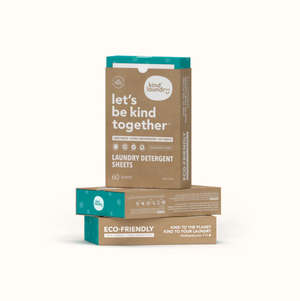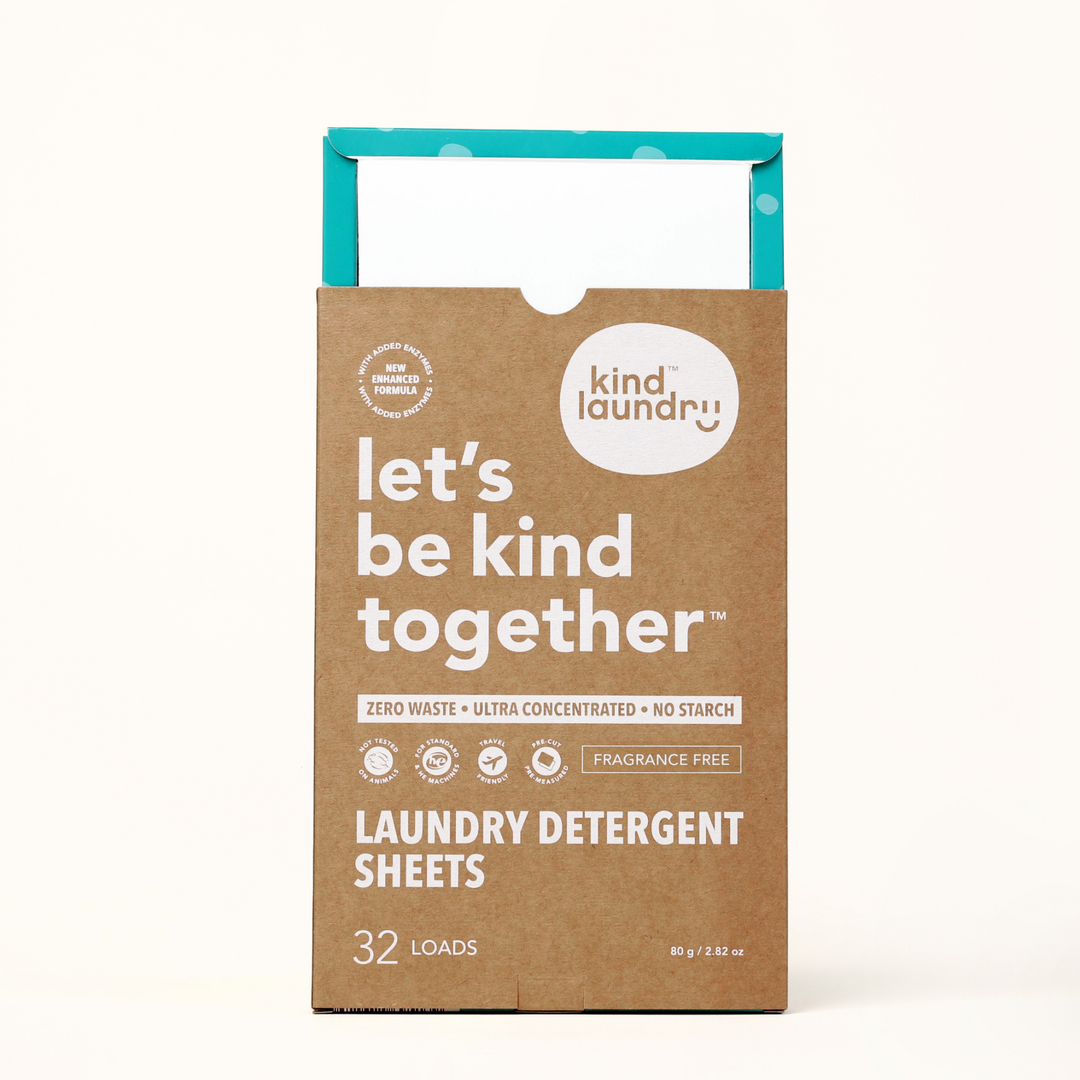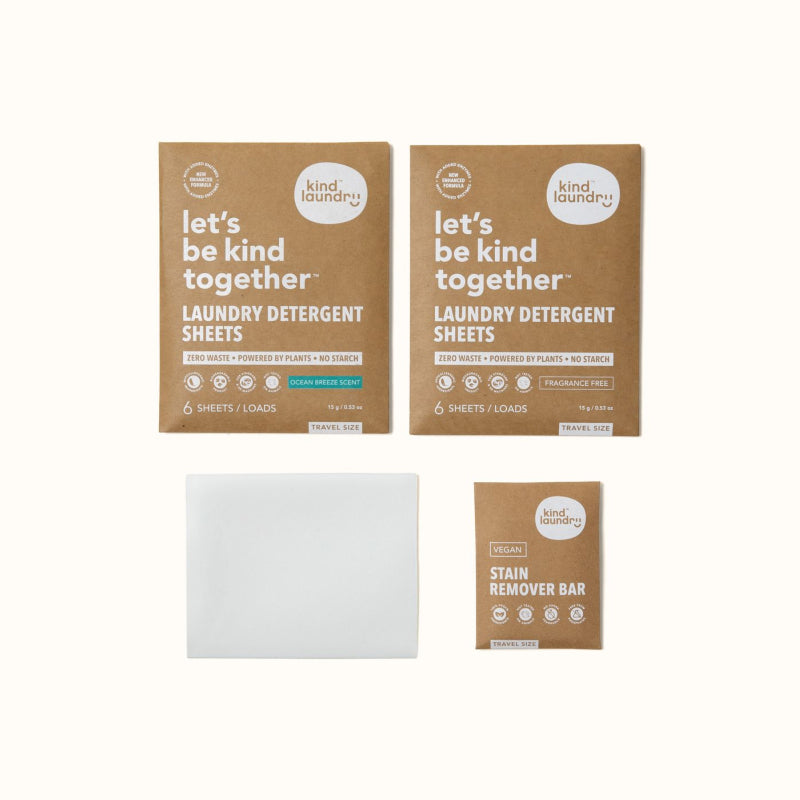Enzymes for laundry were first used in 1913 by Otto Rohm. Over the years enzyme technology was refined and made to withstand heat better, helping to establish enzyme laundry detergent commercially.
People have been using enzymes in laundry detergent for around the last 60 years to effectively help clean clothes and treat stains.
More recently, as people are increasingly looking for ways to lead more sustainable lifestyles, laundry detergents containing biological enzymes have grown in popularity.
But there’s still a lot of confusion about ‘what is an enzyme detergent’.
Enzymes occur naturally in nature, and can also be synthetically manufactured. Known as bio-catalysts, enzymes can be added to laundry detergents to enhance their effectiveness and the speed at which they’re able to clean clothes.
Enzymes help to remove stubborn stains caused by fats, proteins, starches, and other compounds. There are specific enzymes that work on different types of stains that can be added to laundry detergent to help them clean stains more effectively and efficiently. That includes proteases, lipases, amylases, and cellulases.
Below we explore enzymes in more detail including what is an enzyme based detergent, and how enzyme detergents can be used to effectively and efficiently clean laundry. We also explain how Kind Laundry’s detergent sheets are formulated with stain-removing enzymes.
What Is an Enzyme Detergent?
When detergent enzymes are added to laundry detergent granules, liquids or sheets, you get enzyme detergent.
Enzymes are frequently included in laundry detergent ingredients because these biological catalysts can help remove stains faster and more effectively, they can clean clothes at much lower temperatures, and they’re biodegradable.
Together these factors help to reduce energy associated with washing laundry and thereby also helping reduce the cost of doing laundry, as well as reduce people’s carbon footprints.
Most enzymes are made through the fermentation process involving tiny micro organisms. Some enzymes are also made using innovative biotechnology to enhance their functioning even more.
But many people still ask, what is enzyme laundry detergent and what enzymes are used in laundry detergent?
There are many different types of enzymes, with four being commonly used in laundry detergents: protease, amylase, lipase and mannanase. Each different type of enzyme has the ability to target specific types of stains.
For example, the enzyme protease is added to laundry detergent to help target protein related stains, whereas the enzyme amylase is used to treat starch related stains.
Enzyme detergents can therefore be helpful in removing a range of different types of stains, from getting rid of coffee stains on clothing, removing chocolate stains on clothes, washing cloth diapers, washing out stains on winter jackets, removing hair dye from clothes, to removing grass stains.

How Should I Use an Enzymatic Laundry Detergent?
First check the care instructions on your garments to see whether there’s anything that says that you can’t use enzyme detergents. This would typically be on delicate fabrics like wool or silk, which may indicate that you should avoid regularly using these for cleaning the garments.
Next, look at the stain and decide whether it needs to be pretreated in an enzyme soak. If so, wet the stained area and apply some detergent allowing time for it to soak in for around 30 minutes. Then wash out the stain thoroughly. Then you can put the garment in a regular wash, following the care instructions on the garment label.
As enzymes are heat-sensitive and can be made less effective with high temperatures, it’s best to store enzyme detergents somewhere cool and away from sunlight. It’s also important not to use hot water for washing, but to rather opt for a cool wash cycle.
Not only is that better for the planet, but it can also help you save money on energy costs by using a lower temperature machine wash.
What Types of Enzymes Are Used in Our Laundry Detergent?
Now that you know what is an enzyme based laundry detergent, it’s time to take a deeper look at what types of enzymes are typically used in laundry detergents.
There are several different enzymes that are commonly used in laundry detergent. If you’re interested to know what enzymes are used in detergents (and more specifically, what enzymes are used in laundry detergent), there are four main ones to be aware of.
This includes protease, amylase, lipase, and cellulase, and mannanase. Below we explore four of these in more detail and explain why they are useful in cleaning dirty laundry.
-
Protease enzymes
Protease enzyme, aka the protein removing enzyme, is the most commonly used enzyme in laundry detergents.
That’s because it’s very efficient at removing protein stains on clothing, which are very common. Protein-based stains include things like blood, sweat, and grass stains.
Protease is one of our amazing new ingredients in Kind Laundry detergent sheets, helping to lift stubborn stains naturally. Our enzyme detergent sheets have been formulated to remove protein stains like mud, dirt, baby formula and dairy products.
That’s in addition to other ingredients like sapindus mukurossi, camilla japonica, kaolin and sunflower seed oil.
3. Amylase enzymes
Amylase enzymes help to remove starch from clothing as it breaks down the starch quickly and effectively.
Starch stains are relatively common and can be quite tough to get rid of, making amylase quite a good solution for your dirty laundry.
Amylase enzymes can be used for getting rid of potato or pasta stains, rice stains, starchy soup stains, grass stains, as well as sauces, many condiments and cereal stains. Many processed foods and ready-made sauces, desserts and other food products are made from starch and can therefore be treated with amylase.
Known for its starch targeting ability, amylase is typically derived from grains like barley and is sometimes also used in products like sunscreen.
4. Cellulase enzymes
Cellulase enzymes are known for the ability to make the color of your clothes brighter and more restored. So if you’re in need of a dullness-fix, or a color restoration, this enzyme can help.
Cellulase get rid of the dust and dirt that stick to your clothing, which is how it helps to revive colors. It works well on cotton fabric in particular.
And, what’s more, cellulase is also known to help strengthen your fabric and to remove natural stains like from fruit and vegetables.
5. Mannanase enzymes
Mannanase enzymes work by getting rid of stains caused by things like ketchup, ice cream, toothpaste, skin creams or chocolate.
These mannanase enzymes break down mannan stains into small dissolvable sugars that can wash out as you clean your laundry.
By adding mannanase to a laundry detergent, you can then remove stains that contain gums that are often hard to remove without enzymes. For example, mannanase can help remove gum stains from sticky salad dressing or mayonnaise.

Why Enzyme Laundry Detergents Are Preferred?
There are many reasons why enzyme laundry detergents are growing in popularity. That includes the fact that they’re considered more eco-friendly because of their ability to be used at lower temperature wash cycles, helping reduce energy use and therefore carbon footprints.
Enzyme based laundry detergents are also considered more cost-effective as you don’t need to use such large quantities of enzymes to be effective at removing stains.
They’re also very efficient at stain removal, which means they generally require a shorter rinsing time.
And, enzyme based detergents are considered safer for skin as they don’t seem to trigger skin allergies from laundry detergents.
Below we explain these benefits of enzyme laundry detergents in more detail.
-
Eco-Friendly
Washing your laundry on higher temperatures significantly increases energy use, and therefore carbon emissions. That’s because it takes a lot of energy to heat the water used for higher temperature machine washes.
By using a lower temperature for your wash cycle, you can significantly reduce your carbon footprint. But many detergents are not capable of removing stains effectively without warm water.
However, enzymes are so effective at removing stains and they don’t need hot water to do that. That means that by switching to laundry detergent sheets that contain enzymes, you can reduce your carbon emissions.
-
Cost-Effective
Enzyme-based laundry detergent helps to reduce costs associated with laundry, by cutting down on energy costs associated with washing on higher temperatures.
Because you can wash clothes effectively at lower temperatures by using enzymes, households can save significant amounts of their energy bills. This is what helps to make enzyme-based laundry detergents cost effective.
-
Kinder On Skin
Many people experience skin allergies and sensitivities to ingredients in everyday products from skin care products, to laundry detergents.
Using products that are natural and safe for skin of all types and hypoallergenic is therefore increasingly popular around the world.
People in recent decades have been switching over to using enzyme detergents for many reasons, including that they don’t seem to trigger skin allergies.
-
Efficient in Cleaning
Enzymes are highly effective at removing stains, with different enzymes being suited to different types of stains such as protein-based stains or starch stains.
Because they are so efficient in cleaning clothes, you only need a small amount of enzymes to clean your clothes. This helps to reduce the amount of washing ingredients you need to use for every wash load.
-
Shorter Rinsing Time
Enzyme detergents require a shorter rinsing time compared with other non-enzyme laundry detergents. That’s because enzymes are highly water soluble and easily dissolve in water.
They are quick to act and can be washed out quickly and easily too. Shorter rinsing time can result in water and energy savings, helping to be kinder to the planet (and helping to save costs on energy and water bills too).
Key Challenges for Enzyme Laundry Detergents
Enzyme laundry detergents can be sensitive to high temperatures and chemicals, which can prevent them from working as effectively as they would otherwise.
When enzymes were first used, this sensitivity to high temperatures was a stumbling block that was addressed through technology innovations and refining their composition.
It’s therefore important to store enzymes carefully from when they are produced and transported, until when they are stored in your home.
Enzyme-based laundry detergents should be transported and stored at home somewhere cool and out of the sun. That’s because otherwise the detergent’s enzymes could be damaged from the heat.
It’s also important that you don’t mix your laundry powder with any harsh chemicals. Not only are harsh chemicals toxic for your health and the health of the planet, but they may also react with enzymes in your detergent and result in them not working effectively.
What is an Enzyme Presoak?
By now you should have a good understanding of what is enzyme laundry detergent. But beyond what enzymes are used in laundry detergent, you may also be wondering what an enzyme presoak is.
Essentially, enzyme presoak is a pre-wash detergent used to remove stubborn stains before doing the main wash.
There are many occasions that may require you to pre-treat stains, such as ones that are ingrained or have been in a garment a long time.
To use an enzyme presoak, it’s best to first moisten the stain you want to remove, then add the enzyme detergent and rub it in gently to help loosen the stain. You can then rinse it all off and wash as normal, following your garment care instructions.
Conclusion
In this article about what is an enzyme detergent, we’ve looked at the enzymes typically found in laundry detergents. We’ve also looked at the many environmental and health benefits of using enzyme based laundry detergent, and at examples of what is an enzyme based detergent.
We also explained the ingredients in Kind Laundry’s enzyme based laundry detergent sheets. And finally, as part of explaining what is enzyme based laundry detergent, we’ve explained how they can help you to save money (on energy bills), reduce your carbon footprint and clean your clothes more effectively and efficiently.



















